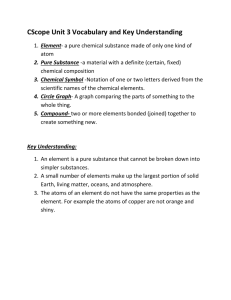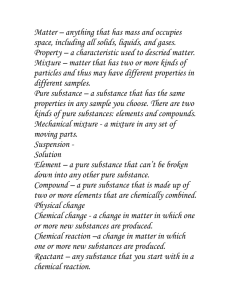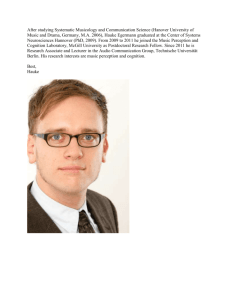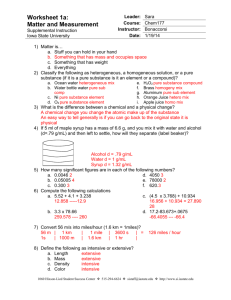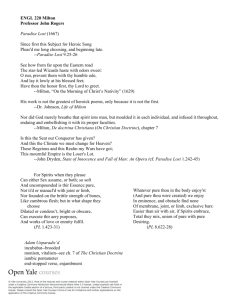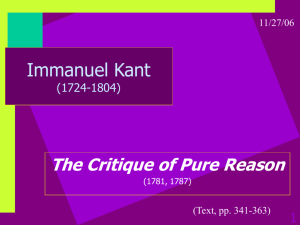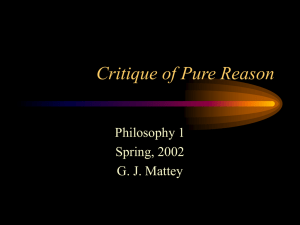Session 5: Kant glossary
advertisement
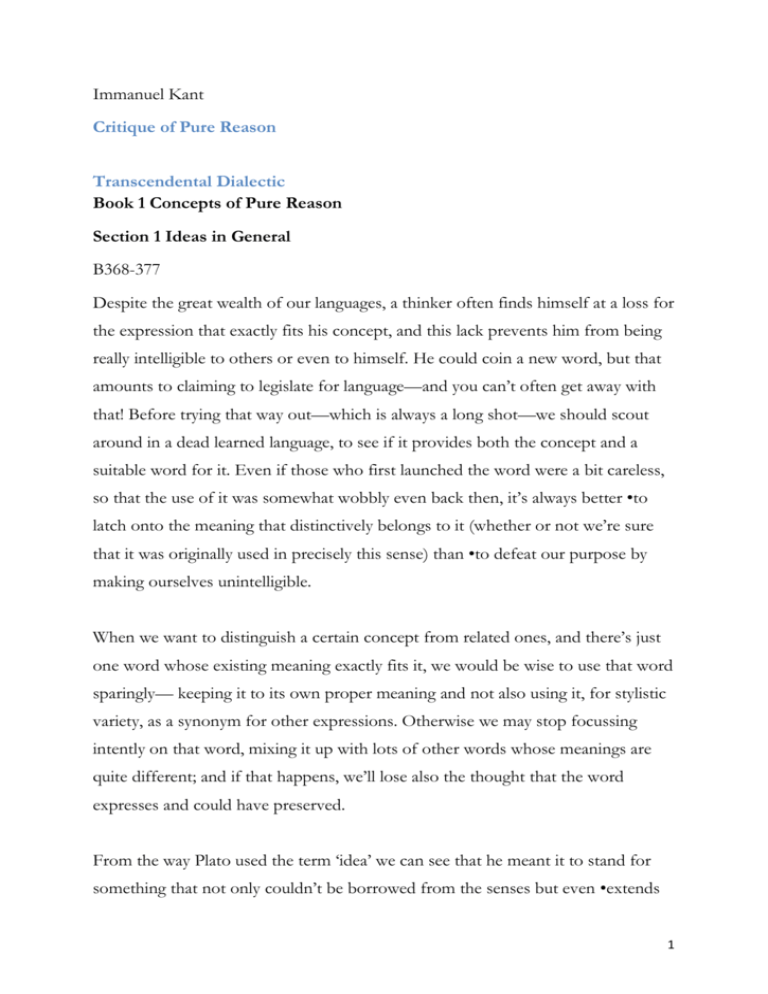
Immanuel Kant Critique of Pure Reason Transcendental Dialectic Book 1 Concepts of Pure Reason Section 1 Ideas in General B368-377 Despite the great wealth of our languages, a thinker often finds himself at a loss for the expression that exactly fits his concept, and this lack prevents him from being really intelligible to others or even to himself. He could coin a new word, but that amounts to claiming to legislate for language—and you can’t often get away with that! Before trying that way out—which is always a long shot—we should scout around in a dead learned language, to see if it provides both the concept and a suitable word for it. Even if those who first launched the word were a bit careless, so that the use of it was somewhat wobbly even back then, it’s always better •to latch onto the meaning that distinctively belongs to it (whether or not we’re sure that it was originally used in precisely this sense) than •to defeat our purpose by making ourselves unintelligible. When we want to distinguish a certain concept from related ones, and there’s just one word whose existing meaning exactly fits it, we would be wise to use that word sparingly— keeping it to its own proper meaning and not also using it, for stylistic variety, as a synonym for other expressions. Otherwise we may stop focussing intently on that word, mixing it up with lots of other words whose meanings are quite different; and if that happens, we’ll lose also the thought that the word expresses and could have preserved. From the way Plato used the term ‘idea’ we can see that he meant it to stand for something that not only couldn’t be borrowed from the senses but even •extends 1 far beyond the concepts of understanding (which Aristotle was busy with)— because nothing that fits it can ever be encountered in experience. ... Following out these considerations is what gives philosophy its own special dignity; but just now we must occupy ourselves with a less grand but still worthwhile task, namely levelling the ground and making it firm enough to support these majestic moral edifices. ·Why does it need to be made firm?· Because this ground has been honeycombed by subterranean workings that reason, in its confident but fruitless search for hidden treasures, has carried out in all directions. What we have to do now is to get some insight into the transcendental use of pure reason, its principles and ideas, so that we can be in a position •to get the facts about what influence pure reason has and •to make a judgment as to its value. I beseech those who have the interests of philosophy at heart ... that they be careful to preserve the expression 'idea' in its original (Platonic) meaning so that it may not become one of those expressions which are commonly used to indicate any and every species of representation, in a happy-go-lucky confusion, to the consequent detriment of science. There is no lack of terms suitable for each kind of representation .... 2 A serial arrangement [Kant's own] is as follows: Latin in ( ), German in [ ] Bottom level: The genus is ‘representation’ in general (repraesentatio). [Vorstellung] Subordinate to it stands representation with consciousness (perceptio), or perception. [Perception] Second level: Perception considered merely as a state of the subject is ‘sensation’ (sensatio). [Empfindung] Perception considered as an objective perception of something is cognition (cognitio). [Erkenntnis] Third level: A cognition relating directly to an individual object is an ‘intuition’ (intuitus). It is single. [Anschauung] A cognition relating indirectly to objects, through features that many objects may share, is a concept (conceptus). [Begriff] Fourth level: Empirical concepts and Pure concepts. Fifth level: ·Pure concepts can be schematised, i.e. amplified by something sensible·. A pure concept originating solely in the understanding, with no input from sensibility, is a notion. [Notio] ·And so at last we rise to our present topic, which involves ‘notion’ but seems not to come from any two-part division of notions, namely: Sixth level·: A concept that is formed from notions and outruns, or transcends, the possibility of experience is an idea. [Idee] Anyone who has familiarised himself with these distinctions must wince when he hears the representation of the colour red called an ‘idea’. It oughtn’t even to be called a concept of understanding, a notion. 3
